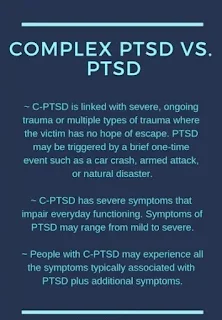Living with CPTSD: The Constant Struggle of Survival Mode and Hypervigilance
Living with CPTSD: The Constant Struggle of Survival Mode and Hypervigilance
Complex Post-Traumatic Stress Disorder (CPTSD) is a condition that has deeply affected every aspect of my life, especially after enduring severe narcissistic abuse. One of the most pervasive symptoms I face daily is being in a constant state of survival mode, which is fueled by hypervigilance—a relentless need to be on high alert, anticipating danger at every turn. This state of heightened awareness isn't just a fleeting feeling; it's an ingrained response to the trauma I’ve experienced, rooted in the destructive patterns of intermittent reinforcement that were a hallmark of the abuse.
Narcissistic abuse is a form of psychological manipulation where the abuser uses tactics like gaslighting, deception, and emotional unpredictability to maintain control. Intermittent reinforcement is one of the most insidious aspects of this abuse. It involves the abuser alternating between moments of kindness and cruelty, creating an unpredictable and unstable environment. This pattern deeply affects the brain, reinforcing the need to stay hyper-aware to avoid the next emotional or psychological attack. Over time, this constant state of uncertainty conditions the brain to remain in survival mode, long after the abuse has ended.
In my daily life, this survival mode manifests as an inability to relax or feel safe. My mind is always racing, scanning for threats, even in situations where there are none. This hypervigilance isn't just mentally exhausting—it's physically draining as well. The stress takes a toll on my body, leaving me fatigued, anxious, and unable to function at my full capacity.
Simple tasks that once felt routine have become monumental challenges. Going to the grocery store, cooking a meal, or even taking a shower can feel like insurmountable obstacles. The constant state of alertness makes it difficult to focus, and the fear of something going wrong is always lurking in the background. Holding down a job or maintaining relationships becomes nearly impossible when your brain is wired to expect danger around every corner.
The impact on my brain is profound. The trauma has essentially rewired my neural pathways, making it difficult to switch off the survival mode. My body and mind are stuck in a loop of constant preparedness, always waiting for the next threat, even when none exists. This has led to a breakdown in my ability to take care of myself. Basic self-care routines, like brushing my teeth or getting dressed, can feel overwhelming because my brain is so consumed with managing the perceived dangers around me.
This constant hypervigilance and survival mode have crippled my daily life. Tasks that others might take for granted are monumental for me. The need to be on high alert has eroded my ability to engage with the world in a meaningful way, leaving me isolated and disconnected. The unpredictability of my abuser’s behavior conditioned me to believe that safety is an illusion, and this belief still governs my actions today.
Living with CPTSD means living with the scars of narcissistic abuse every day. The constant state of survival mode and hypervigilance is a reminder of the trauma I endured, and it has profoundly impacted my ability to function in the world. But sharing my experience is part of my journey toward healing. By shedding light on the effects of narcissistic abuse and CPTSD, I hope to help others who are struggling with similar challenges. You're not alone, and while the road to recovery is long, acknowledging the impact of trauma is the first step toward reclaiming your life.




Comments
Post a Comment
Please leave a comment